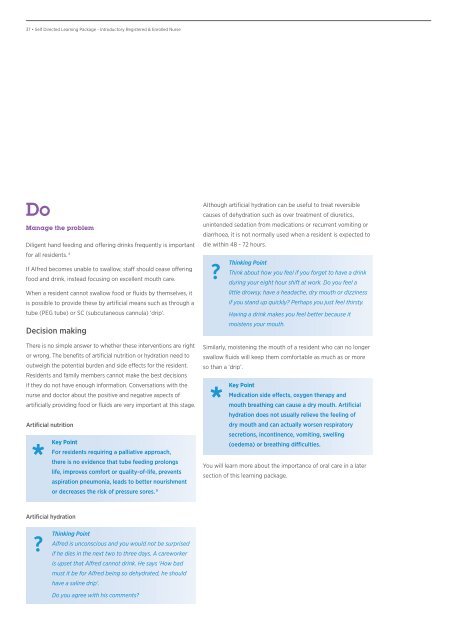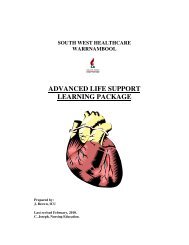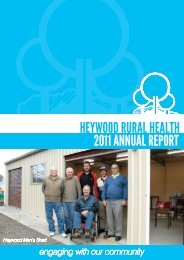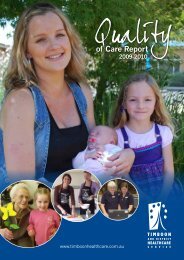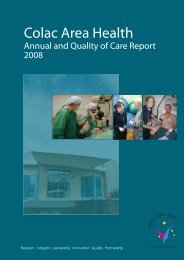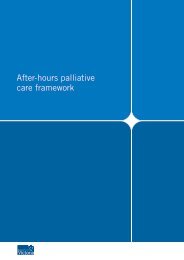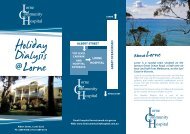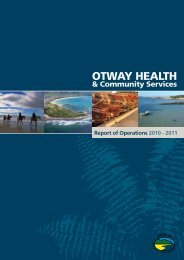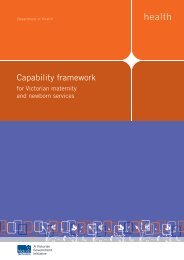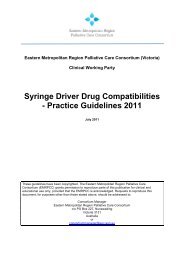Self Directed Learning Package - University of Queensland
Self Directed Learning Package - University of Queensland
Self Directed Learning Package - University of Queensland
- No tags were found...
You also want an ePaper? Increase the reach of your titles
YUMPU automatically turns print PDFs into web optimized ePapers that Google loves.
37 • <strong>Self</strong> <strong>Directed</strong> <strong>Learning</strong> <strong>Package</strong> - Introductory Registered & Enrolled NurseDoManage the problemDiligent hand feeding and <strong>of</strong>fering drinks frequently is importantfor all residents. 4If Alfred becomes unable to swallow, staff should cease <strong>of</strong>feringfood and drink, instead focusing on excellent mouth care.When a resident cannot swallow food or fluids by themselves, itis possible to provide these by artificial means such as through atube (PEG tube) or SC (subcutaneous cannula) ‘drip’.Decision makingThere is no simple answer to whether these interventions are rightor wrong. The benefits <strong>of</strong> artificial nutrition or hydration need tooutweigh the potential burden and side effects for the resident.Residents and family members cannot make the best decisionsif they do not have enough information. Conversations with thenurse and doctor about the positive and negative aspects <strong>of</strong>artificially providing food or fluids are very important at this stage.Artificial nutritionKey PointFor residents requiring a palliative approach,there is no evidence that tube feeding prolongslife, improves comfort or quality-<strong>of</strong>-life, preventsaspiration pneumonia, leads to better nourishmentor decreases the risk <strong>of</strong> pressure sores. 6Although artificial hydration can be useful to treat reversiblecauses <strong>of</strong> dehydration such as over treatment <strong>of</strong> diuretics,unintended sedation from medications or recurrent vomiting ordiarrhoea, it is not normally used when a resident is expected todie within 48 - 72 hours.Thinking PointThink about how you feel if you forget to have a drinkduring your eight hour shift at work. Do you feel alittle drowsy, have a headache, dry mouth or dizzinessif you stand up quickly? Perhaps you just feel thirsty.Having a drink makes you feel better because itmoistens your mouth.Similarly, moistening the mouth <strong>of</strong> a resident who can no longerswallow fluids will keep them comfortable as much as or moreso than a ‘drip’.Key PointMedication side effects, oxygen therapy andmouth breathing can cause a dry mouth. Artificialhydration does not usually relieve the feeling <strong>of</strong>dry mouth and can actually worsen respiratorysecretions, incontinence, vomiting, swelling(oedema) or breathing difficulties.You will learn more about the importance <strong>of</strong> oral care in a latersection <strong>of</strong> this learning package.Artificial hydrationThinking PointAlfred is unconscious and you would not be surprisedif he dies in the next two to three days. A careworkeris upset that Alfred cannot drink. He says ‘How badmust it be for Alfred being so dehydrated, he shouldhave a saline drip’.Do you agree with his comments?


